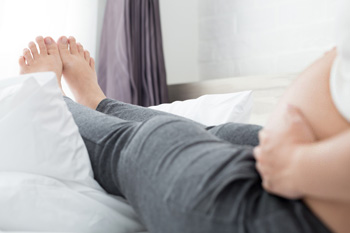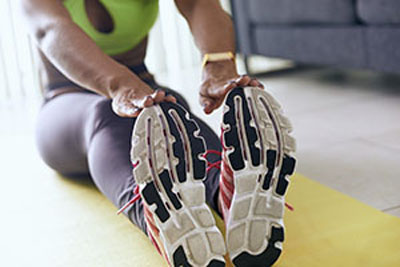 The heel is designed to absorb the weight of your body when taking on most forms of exercising such as walking or running. Heel pain can be debilitating and can have an impact on your everyday life. The most common type of heel pain is plantar fasciitis. Plantar fasciitis can occur when the plantar fascia, the tissue that runs along the bottom of the foot and connects the heel to the toes, becomes inflamed. Heel spurs can be another cause of heel pain that may occur when calcium builds up in the heel and protrudes outward. When the fluid filled fibrous sac under the heel bone becomes inflamed, heel bursitis occurs. The heel bone is protected by a fat pad at the bottom of the heel, and if this pad becomes worn, pain can result as well. These are just some of the various causes of heel pain. If you are struggling with heel pain, consulting with a podiatrist for a proper diagnosis and treatment method is highly suggested.
The heel is designed to absorb the weight of your body when taking on most forms of exercising such as walking or running. Heel pain can be debilitating and can have an impact on your everyday life. The most common type of heel pain is plantar fasciitis. Plantar fasciitis can occur when the plantar fascia, the tissue that runs along the bottom of the foot and connects the heel to the toes, becomes inflamed. Heel spurs can be another cause of heel pain that may occur when calcium builds up in the heel and protrudes outward. When the fluid filled fibrous sac under the heel bone becomes inflamed, heel bursitis occurs. The heel bone is protected by a fat pad at the bottom of the heel, and if this pad becomes worn, pain can result as well. These are just some of the various causes of heel pain. If you are struggling with heel pain, consulting with a podiatrist for a proper diagnosis and treatment method is highly suggested.
Many people suffer from bouts of heel pain. For more information, contact Dr. Richard DiMario of Maine. Our doctor can provide the care you need to keep you pain-free and on your feet.
Causes of Heel Pain
Heel pain is often associated with plantar fasciitis. The plantar fascia is a band of tissues that extends along the bottom of the foot. A rip or tear in this ligament can cause inflammation of the tissue.
Achilles tendonitis is another cause of heel pain. Inflammation of the Achilles tendon will cause pain from fractures and muscle tearing. Lack of flexibility is also another symptom.
Heel spurs are another cause of pain. When the tissues of the plantar fascia undergo a great deal of stress, it can lead to ligament separation from the heel bone, causing heel spurs.
Why Might Heel Pain Occur?
Treatments
Heel pain should be treated as soon as possible for immediate results. Keeping your feet in a stress-free environment will help. If you suffer from Achilles tendonitis or plantar fasciitis, applying ice will reduce the swelling. Stretching before an exercise like running will help the muscles. Using all these tips will help make heel pain a condition of the past.
If you have any questions please contact our office located in York, ME . We offer the newest diagnostic and treatment technologies for all your foot and ankle needs.
 Did you know that during pregnancy, your body produces up to 50% more blood and fluids than usual in order to meet the baby’s needs? This extra fluid often pools in the lower limbs and leads to swelling in the feet, ankles, and legs, which can cause aches, heaviness, and discomfort as you go about your day. If you are experiencing swollen feet and ankles, it may help to elevate your feet several times throughout the day for a few minutes at a time. While your feet are elevated, moving them in small circles and performing other foot and ankle exercises can help move some of that fluid upwards. Other things that may help reduce swelling include limiting your salt intake, sleeping on your left side, staying cool by avoiding hot temperatures, and wearing compression stockings. To learn more about your foot and ankle health during pregnancy, please consult with a podiatrist.
Did you know that during pregnancy, your body produces up to 50% more blood and fluids than usual in order to meet the baby’s needs? This extra fluid often pools in the lower limbs and leads to swelling in the feet, ankles, and legs, which can cause aches, heaviness, and discomfort as you go about your day. If you are experiencing swollen feet and ankles, it may help to elevate your feet several times throughout the day for a few minutes at a time. While your feet are elevated, moving them in small circles and performing other foot and ankle exercises can help move some of that fluid upwards. Other things that may help reduce swelling include limiting your salt intake, sleeping on your left side, staying cool by avoiding hot temperatures, and wearing compression stockings. To learn more about your foot and ankle health during pregnancy, please consult with a podiatrist.
Pregnant women with swollen feet can be treated with a variety of different methods that are readily available. For more information about other cures for swollen feet during pregnancy, consult with Dr. Richard DiMario from Maine. Our doctor will attend to all of your foot and ankle needs.
What Foot Problems Can Arise During Pregnancy?
One problem that can occur is overpronation, which occurs when the arch of the foot flattens and tends to roll inward. This can cause pain and discomfort in your heels while you’re walking or even just standing up, trying to support your baby.
Another problem is edema, or swelling in the extremities. This often affects the feet during pregnancy but tends to occur in the later stages.
How Can I Keep My Feet Healthy During Pregnancy?
If you have any questions please feel free to contact our office located in York, ME . We offer the newest diagnostic and treatment technologies for all your foot and ankle needs.
Pregnancy causes many changes in your body, including your feet. Swelling in the feet or ankles (edema) may occur, especially at the end of the day or after spending time on your feet. You can help alleviate this discomfort by elevating your feet whenever you get the chance, keeping yourself hydrated, wearing comfortable shoes with low heels, exercising your feet by rotating them and flexing them up and down, and sleeping on your left side to help circulation. While edema will normally subside after pregnancy, an increase in your foot’s size may not. A hormone called relaxin is released during pregnancy to prepare your body for birth, which can also relax the ligaments in your feet, causing them to lengthen and widen. To keep your feet as comfortable as possible during pregnancy, wear flat or low-heeled shoes with good arch support. As you advance in your pregnancy, you may want to avoid laces and opt for slip-on shoes, and always check your foot size before buying new shoes. For more information on how to properly care for and dress your feet during pregnancy, consult with a podiatrist.
Getting the right shoe size is an important part of proper foot health. Seek the assistance of Dr. Richard DiMario from Maine. Our doctor will provide the care you need to keep you pain-free and on your feet.
Getting the Right Shoe Size
There are many people who wear shoes that are the incorrect size, negatively affecting their feet and posture. Selecting the right shoes is not a difficult process, so long as you keep several things in mind when it comes to choosing the right pair.
As our feet hold our body weight and keep us moving, it is important to treat them right. Picking the right pair of shoes can provide your feet comfort and mobility without pain.
If you have any questions, please feel free to contact our office located in York, ME . We offer the newest diagnostic and treatment technologies for all your foot care needs.
Cracked  heels are a common foot problem that can affect up to one in five adults. While cracked heels aren’t usually a big issue for most, they can lead to discomfort and severe pain. There are a variety of factors that can lead to cracked heels. These include standing for long periods of time, walking barefoot, using harsh soaps, dry skin from the climate, and shoes that don’t support the heels. Medical causes such as a vitamin deficiency, fungal infection, obesity, or pregnancy can also lead to cracked heels. In order to prevent cracked heels, make sure to wear shoes that properly support the heels by avoiding shoes with an open back, tall skinny heel, or shoes that are too tight. Staying hydrated, using a foot cream, avoiding standing in one place for a long period of time, and using custom shoe inserts are all ways to help prevent and treat cracked heels. If you have painful cracked heels, consulting with a podiatrist is suggested for a proper treatment method.
heels are a common foot problem that can affect up to one in five adults. While cracked heels aren’t usually a big issue for most, they can lead to discomfort and severe pain. There are a variety of factors that can lead to cracked heels. These include standing for long periods of time, walking barefoot, using harsh soaps, dry skin from the climate, and shoes that don’t support the heels. Medical causes such as a vitamin deficiency, fungal infection, obesity, or pregnancy can also lead to cracked heels. In order to prevent cracked heels, make sure to wear shoes that properly support the heels by avoiding shoes with an open back, tall skinny heel, or shoes that are too tight. Staying hydrated, using a foot cream, avoiding standing in one place for a long period of time, and using custom shoe inserts are all ways to help prevent and treat cracked heels. If you have painful cracked heels, consulting with a podiatrist is suggested for a proper treatment method.
If the skin on your feet starts to crack, you may want to see a podiatrist to find treatment. If you have any concerns, contact Dr. Richard DiMario from Maine. Our doctor can provide the care you need to keep you pain-free and on your feet.
Cracked Heels
It is important to moisturize your cracked heels in order to prevent pain, bleeding, and infection. The reason cracked heels form is because the skin on the foot is too dry to support the immense pressure placed on them. When the foot expands, the dry skin on the foot begins to split.
Ways to Help Heal Them
Ways to Prevent Cracked Heels
If you are unsure how to proceed in treating cracked heels, seek guidance from a podiatrist. Your doctor will help you with any questions or information you may need.
If you have any questions, please feel free to contact our office located in York, ME . We offer the newest diagnostic and treatment technologies for all your foot care needs.